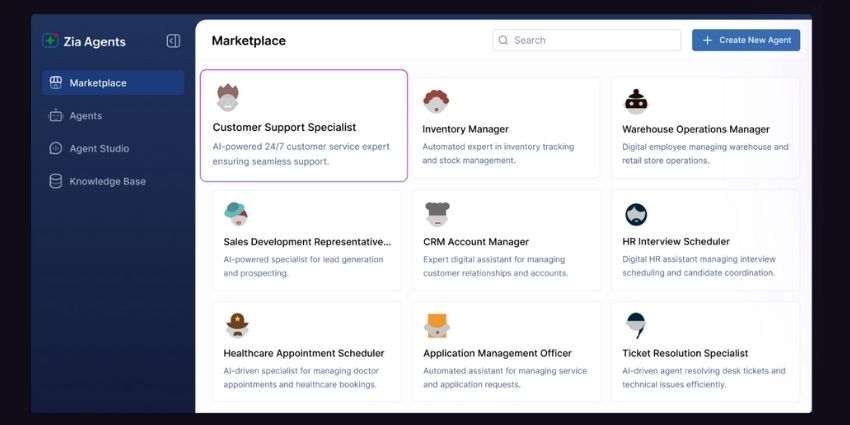Like most of its competitors, Zoho is evolving its AI strategy.
It’s no longer just focused on virtual assistants or “copilots” that assist employees working within its applications; it’s embracing the era of AI agents.
With this transition, Zoho is expanding its Zia product to become a hub for agentic AI.
At Zoho Day 2025, the tech juggernaut announced these plans, ushering in the release of Zoho Zia Agents.
Some Zia Agents will be pre-configured to automate specific tasks across the Zoho ecosystem.
However, companies can also build their own custom agents via the no-code/low-code Agent Studio.
Much of Zoho’s competition has made similar moves, including Microsoft, SAP, and Salesforce.
Yet, the vendor has teased cost-effective pricing models as a key differentiator to democratize access to affordable agentic AI.
What Are Zoho Zia Agents?
AI agents can reason and adapt to automate business workflows. They can also collaborate to mechanize multi-step processes.
Zoho Zia Agents are no different, automating workflows and enhancing efficiency across Zoho’s ecosystem of more than 100 apps.
Zoho CRM is the vendor’s most widely utilized app. Zia agents can support users in handling service, sales, and marketing tasks, from nurturing leads to constructing multi-channel campaigns.
Yet, there are many more pre-configured agents and possibilities for custom agents, which tap into data from across the Zoho ecosystem.
As Zoho owns so much of the enterprise tech stack, its agents can also leverage a wealth of business data, including metadata and operational data, to optimize the performance of cross-functional agents.
These agents can also reason as to the most reliable data source and act on that, whether they’re assigning leads to sales staff or generating reports.
The Zoho Agent Studio and Marketplace
At Zoho Day 2025, the company announced its Zia Agents alongside two new products: the Zoho Agent Studio and Agent Marketplace.
The Studio allows organizations to build their own agents, offering a low-code, no-code environment where creators can essentially chat with an agent, largely through natural language prompts.
Those agents can draw on proprietary data and interact with apps throughout the Zoho environment.
As such, companies create enterprise-wide designs, from agents that offer sales training to those that auto-fill performance evaluations.
Interestingly, businesses may also build “hierarchies” of agents, meaning organizations can have parent agents that oversee larger tasks, and child agents that execute specific actions.
Then, there’s the Agent Marketplace, which comprises pre-built Zia Agents. Businesses can deploy some of these in just minutes.
Companies can also develop and share their own agents on the marketplace for other teams to use.
This could open the door to a brand-new ecosystem within Zoho, where companies may even be able to monetize the agents that they create.
What Can Zoho Zia Agents Do?
Since Zoho Zia Agents take advantage of Zoho’s ever-growing range of applications, the possibilities are practically endless.
In the Agent Marketplace, companies can already access pre-built options like:
- Customer Support Agents: These customer service agents handle tickets and address troubleshooting tasks 24/7, or route customers to human beings when necessary.
- Inventory Management Agents: These agents monitor stock levels, re-order items automatically, generate purchase orders, or highlight seasonal trends.
- Sales Training Agents: These intelligent coaching agents help with onboarding new representatives, providing step-by-step guidance, and delivering feedback.
- Marketing Assistants: These agents help with fine-tuning email lists, evaluating lead generation metrics, streamlining social media campaigns, and more.
- HR Assistants: These agents can track down potential candidates, schedule interviews, and follow up with potential employees.
- Data Management Agents: These agents can help with cleaning data, merging duplicate records, standardizing naming conventions, and flagging issues.
- Sales Development Agents: These agents can perform prospecting tasks, generate leads, qualify potential customers, and pass them on to human team members.
Notably, these agents can collaborate with custom agents to extend their capabilities. That option is available through Zia’s “orchestration” capability.
Meanwhile, as noted earlier, they can also create agent hierarchies.
For instance, companies can have a single customer success manager agent overseeing support specialists, account managers, retention specialists, and onboarding specialists.
The Evolving Opportunities
Alongside the examples above, Zoho is also developing pre-configured Zia agents tied to specific industries. For instance, it offers a healthcare appointment scheduler agent and a warehouse operations agent.
Since Zoho customers can deploy their own agents on the marketplace too, this selection is likely to expand quickly.
Plus, if companies can’t find the agent they need in the marketplace, they can use the Zia Agent Studio to configure their own.
Users can summon these agents instantly by using Ask Zia.
Going forward, Zoho also plans to make Zia Agents deployable in third-party applications for more advanced workflow automation.
Zoho Zia Agents: Flexible, Affordable AI
Zoho is far from the only company experimenting with agentic AI solutions. For instance, Salesforce is all-in on Agentforce, and Microsoft has its Copilot Studio. However, Zoho does have one unique edge.
Unlike most competitors, Zoho has committed to making its AI technologies as affordable and easily accessible as possible.
Critically, Zoho owns its own infrastructure and most of its AI technology, which means it can easily lower the total cost of ownership for customers.
Plus, by developing its own AI, rather than relying on off-the-shelf models, Zoho can plan ahead more effectively, without having to adapt to partner release timelines.
Zoho believes companies won’t be able to continue charging a premium for AI for long. Zoho Zia Agents introduce an opportunity to make this technology more accessible to the masses.







